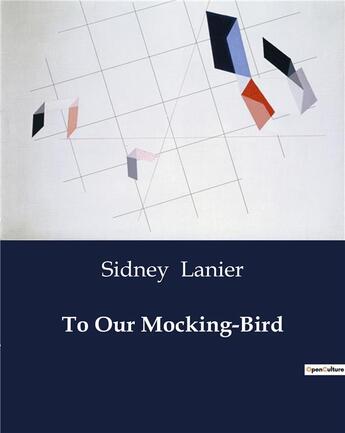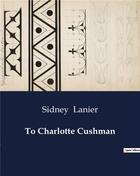-
Date de parution : 25/02/2024
-
Editeur :
Culturea
-
EAN : 9791041986378
-
Série :
(-)
-
Support :
Papier
Résumé:
"To Our Mocking-Bird" is a poem written by Sidney Lanier, an American poet, musician, and scholar of the 19th century. Sidney Lanier (1842-1881) is known for his lyrical poetry, often inspired by nature and the American South. "To Our Mocking-Bird" is an example of his poetic expression and love... Voir plus
"To Our Mocking-Bird" is a poem written by Sidney Lanier, an American poet, musician, and scholar of the 19th century. Sidney Lanier (1842-1881) is known for his lyrical poetry, often inspired by nature and the American South. "To Our Mocking-Bird" is an example of his poetic expression and love for the natural world.
In the poem, Lanier addresses a mockingbird, a bird known for its ability to mimic the sounds of other birds. Here's an excerpt from the poem:
"That is his song, made of his joys and woes,
The fervent prison of his joys and woes;
That is his song, made of his joys and woes,
The fervent prison of his joys and woes."
Key features of "To Our Mocking-Bird" include:
Nature Imagery: The poem uses vivid imagery to depict the mockingbird and its surroundings, emphasizing the bird's ability to express both joy and sorrow through its song.
Lyrical Quality: Lanier's poetry is characterized by its musical and lyrical quality, influenced by his background as a musician and flutist. This musicality is evident in the rhythm and language of the poem.
Connection with Nature: Lanier often found inspiration in the natural world, and "To Our Mocking-Bird" is an example of his exploration of the relationship between humanity and nature.
Symbolism: The mockingbird in the poem can be seen as a symbol of the poet himself or a representation of the human experience. The bird's ability to mimic various sounds reflects the multifaceted nature of human emotions.
Sidney Lanier's poetry, including "To Our Mocking-Bird," reflects the Romantic tradition and the influence of nature on artistic expression. His work is recognized for its beauty, musicality, and exploration of the interconnectedness between the human spirit and the natural world.
Donner votre avis















